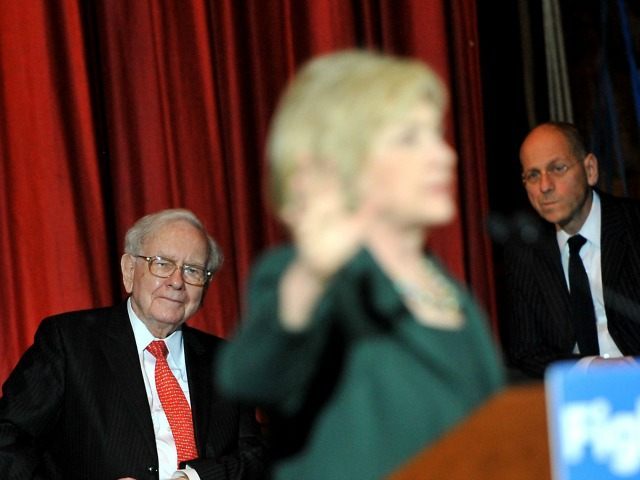It can be taken as a sign of both ideological exhaustion and propaganda success that liberals still paint Republicans as the party of the Evil Rich, when it’s patently obvious there are plenty of big-money interests sitting behind the Democrat Party.
Big money is always interested in buying political influence, and Democrats have been holding clearance sales for years.
Thus we have New York magazine sneering that “Republican Billionaires Just Can’t Seem to Buy This Election,” while forgetting to mention that Democrat billionaire Tom Steyer bought the Party of the Little Guy at retail prices, and proceeded to spend a gigantic wad of cash in a failed attempt to purchase the 2014 midterm election. Democrat billionaires have a way of becoming invisible, unless the media is constantly prodded into mentioning them.
With due allowances made for what isn’t mentioned, the New York piece makes fair points about consultants like Karl Rove blowing the 2012 election, and Jeb Bush’s well-heeled backers spending an awful lot of dough to notch three percent in the polls. Actually, the situation portrayed in the article might be best described not as billionaires failing to buy elections, but consultants failing to deliver them.
Lessons appear to have been learned:
Working under the assumption that they can support a campaign better themselves, donors are building their own organizations, staffed by operatives who report to them. “A lot of people who felt betrayed in 2012 set out to build political structures,” says Kellyanne Conway, president of the pro–Ted Cruz super-pac Keep the Promise I, which is backed by hedge-fund billionaire Robert Mercer. Mercer is a prime example of the new breed of activist donor. This presidential cycle, he has donated more than $30 million to a quartet of pro-Cruz super-pacs. A computer scientist by training, Mercer is also part owner of a political data firm called Cambridge Analytica, which boasts on its website that it employs “psychographic profiling” to recruit voters. As a result, Mercer’s pacs have shunned the traditional strategy of saturation TV coverage. Instead, Mercer is focused on targeted radio buys, digital outreach, and field organizing.
The savviest GOP candidates have capitalized on this shift. In fact, Cruz’s campaign fund-raising apparatus seems designed to let donors roll up their sleeves. Cruz contributors can specify how they want their money spent, much in the way universities allow benefactors to earmark their donations for a new science wing or aquatics center. “If you’re a donor, you can say, ‘I want to see this money used for Iowa,’ ” one strategist told me. “It’s a way to entice donors. They look at it like fantasy football.”
Some of these new and improved campaign operations have learned to fight like Democrats. For example, oppo-research firm America Rising is “narrowly focused on digging up dirt on Democrats, for example by sending video trackers to events in order to build a library of unflattering material.” That’s exactly how Democrat trackers helped pull of Obama’s “Kill Romney” campaign, isn’t it? “Forty-Seven Percent” video, anyone?
Campaign tactics aren’t directly related to funding sources; one comes away from the New York piece with the sense that some billionaires are spending their political money much more carefully than others. A great many small donors are investing in Republicans this cycle as well, especially in the campaigns of Ben Carson and Ted Cruz.
The notion that Republicans are uniquely the party of selfish fat cats is absurd. How can anyone take that argument with a straight face when Cash Clinton is in the race, swinging around bags of influence-peddling loot and using a sham “charity” to keep her gigantic political machine lubricated for the big race? How about all that Wall Street money in Hillary’s pockets?
Of course, when Democrats cozy up to Big Business, the media portrays them as razor-sharp technocrats forging useful business alliances for the betterment of the nation.
Reuters found a thousand White House appointments for Fortune 100 CEOs, with Barack Obama himself present for about half of them… and his adviser Valerie Jarrett boasted that number is just “the tip of the iceberg.” Jarrett went on to portray business titans as grateful to Obama for saving them from a crisis that would have been caused by Republican resistance to raising the debt ceiling.
After the “fiscal cliff” deal in 2012, Reuters says CEOs and the White House became allies in “advocating for immigration reform, the Trans-Pacific Partnership trade deal, and reauthorization for the Export-Import bank.” That’s a lot of Big Business belly-rubbing for the ostensible Party of the Little Guy.
One doubts this would be collaboration would be portrayed in a positive light at all, if we were talking about a Republican president holding hundreds of meetings with big CEOs while the economy languished, the workforce declined, wages stagnated, and income inequality got worse.
Let’s grow up, and understand that Democrats have their own big-money special interests, plus some they share with Republicans.
There are high rollers who are very interested in tax breaks, subsidies, and regulatory favors from the kind of Leviathan State favored by the Left… and also interested in using the State’s compulsive power against their competitors. There is no conceivable Big Government environment in which Big Bucks won’t buy special privileges. There is no way a given hard-working middle-class taxpayer will ever have as much political influence as a billionaire.
The more power the central government accumulates, the more influence it has to trade. Everyone involved in these transactions would love to keep the public’s attention focused elsewhere.
Also, not everything corporate titans and billionaire donors want is inherently bad. The pure essence of populism is the conviction that everyone with influence is out to screw everyone who doesn’t have it. The truth is more complicated than that.
But there is one simple truth that New York magazine should recognize: Politicized economies invariably favor giant, well-connected interests, despite being sold on precisely the opposite terms.

COMMENTS
Please let us know if you're having issues with commenting.